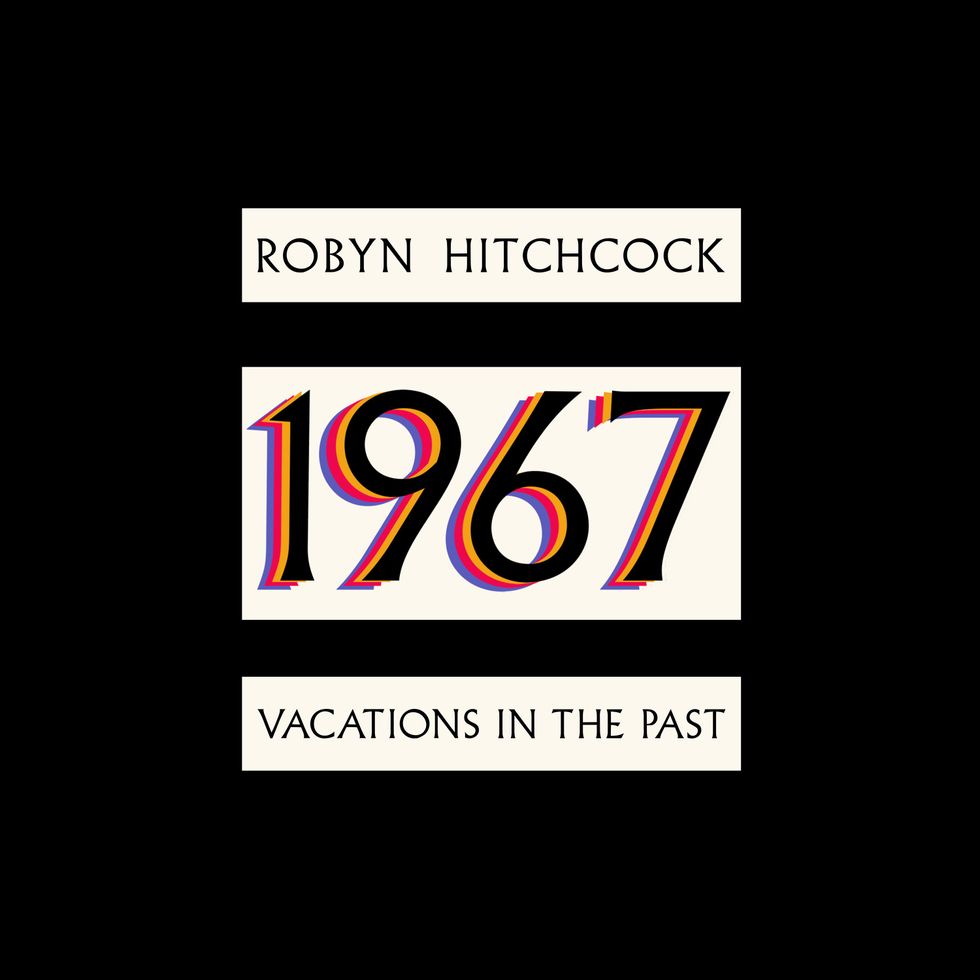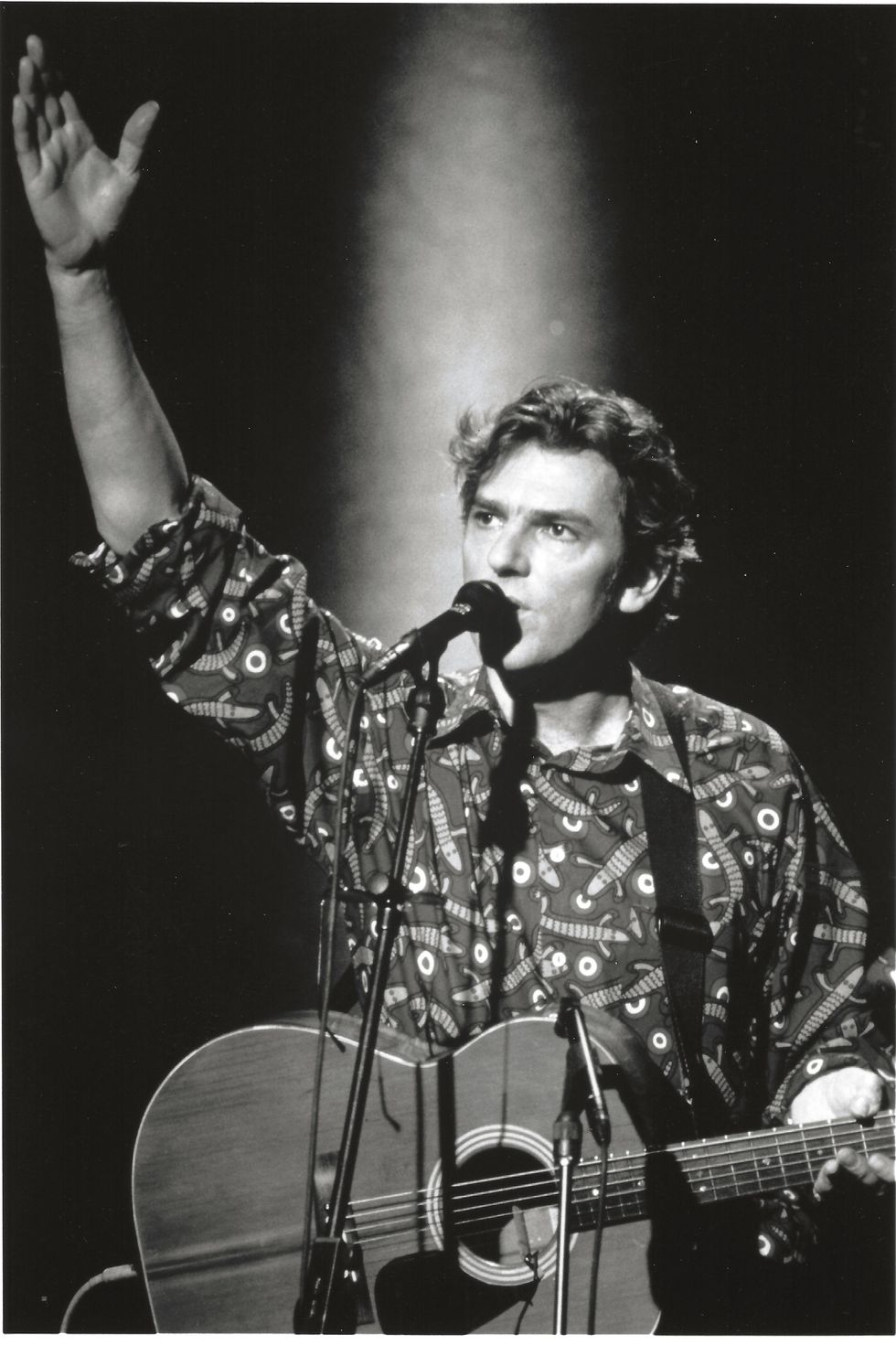Itchycoo Park
“I like my songs, but I don’t necessarily think I’m the best singer of them,” he effaces to me over Zoom, as it’s approaching midnight where he’s staying in London. “I just wanted to be a singer-songwriter because that’s what Bob Dylan did. And I like to create; I’m happiest when I’m producing something. But my records are blueprints, really. They just show you what the song could be, but they’re not necessarily the best performance of them. Whereas if you listen to … oh, I don’t know, the great records of ’67, they actually sound like the best performances you could get.”
He mentions that particular year not offhandedly, but because that’s the theme of the conversation: He’s just released an album, 1967: Vacations in the Past, which is a collection of covers of songs released in 1967, and one original song—the title track. Boasting his takes on Procol Harum’s “A Whiter Shade of Pale,” the Beatles’ “A Day in the Life,” Pink Floyd’s “See Emily Play,” and Small Faces’ “Itchycoo Park,” among eight other tracks, it serves as a sort of soundtrack or musical accompaniment to his new memoir, 1967: How I Got There and Why I Never Left.
Hitchcock, who was 14 years old and attending boarding school in England in 1967, describes how who he is today is encased in that period of his life, much like a mosquito in amber. But why share that with the world now?

In the mid ’70s, before he launched his solo career, Hitchcock was the leader of the psychedelic group the Soft Boys.
Photo by Tim Bugbee/tinnitus photography
“I’m 71; I’ve been alive quite a long time,” he shares. “If I want to leave a record of anything apart from all the songs I’ve written, now is a good time to do it. By writing about 1966 to ’67, I’m basically giving the context for Robyn Hitchcock, as Robyn Hitchcock then lived the rest of his life.”
Hopefully, I say, the publication of these works won’t ring as some sort of death knell for him.
“Well, it’s a relative death knell,” he replies. “But everyone’s on the conveyor belt. We all go over the edge. And none of our legacies are permanent. Even the plastic chairs and Coke bottles and stuff like that that we’re leaving behind…. In 10- or 20-thousand-years’ time, we’ll probably just be some weird, scummy layer on the great fruitcake of the Earth. But I suppose you do probably get to an age where you want to try and explain yourself, maybe to yourself. Maybe it’s me that needs to read the book, you know?”
“I’m basically giving the context for Robyn Hitchcock, as Robyn Hitchcock then lived the rest of his life.”
To counter his description of his songs above, I would say that Hitchcock’s performances on 1967: Vacations in the Past carve out their own deserved little planet in the vintage-rock Milky Way. I was excited in particular by some of his selections: the endorsement of foundational prog in the Procol Harum cover; the otherwise forgotten Traffic tune, “No Face, No Name and No Number,” off of Mr. Fantasy, the Mamas & the Papas’ nostalgic “San Francisco,” and of course, the aforementioned Floyd single. There’s also the lesser known “My White Bicycle” by Tomorrow and “I Can Hear the Grass Grow” by the Move, and the Hendrix B-side, “Burning of the Midnight Lamp.”
Through these recordings, Hitchcock pays homage to “that lovely time when people were inventing new strands of music, and they couldn’t define them,” he replies. “People didn’t really know what to call Pink Floyd. Was it jazz, or was it pop, or psychedelia, or freeform, or systems music?”
His renditions call to mind a cooking reduction, defined by Wikipedia as “the process of thickening and intensifying the flavor of a liquid mixture, such as a soup, sauce, wine, or juice, by simmering or boiling.” Hitchcock’s distinctive, classic folk-singer voice and steel-string-guided arrangements do just that to this iconic roster. There are some gentle twists and turns—Eastern-instrumental touches; subtly applied, ethereal delay and reverb, and the like—but nothing that should cloud the revived conduit to the listener’s memory of the originals.
And yet, here’s his review of his music, in general: “I hear [my songs] back and I think, ‘God, my voice is horrible! This is just … ugh! Why do I sing through my nose like that?’ And the answer is because Bob Dylan sang through his nose, you know. I was just singing through Bob Dylan’s nose, really.”

1967: Vacations in the Pastfeatures 11 covers of songs that were released in 1967, and one original song—the title track.
❦
“I wait for songs to come to me: They’re independent like cats, rather than like dogs who will faithfully trail you everywhere,” Hitchcock explains, sharing about his songwriting process. “All I can do is leave a plate of food out for the songs—in the form of my open mind—and hope they will appear in there, hungry for my neural pathways.”
Once he’s domesticated the wild idea, he says, “It’s important to remain as unselfconscious as possible in the [writing] process. If I start worrying about composing the next line, the embryonic song slips away from me. Often I’m left with a verse-and-a-half and an unresolved melody because my creation has lost its innocence and fled from my brain.
“[Then] there are times when creativity itself is simply not what’s called for: You just have to do some more living until the songs appear again. That’s as close as I can get to describing the process, which still, thankfully, remains mysterious to me after all this time.”
“In 10- or 20-thousand-years’ time, we’ll probably just be some weird, scummy layer on the great fruitcake of the Earth.”
In the prose of 1967: How I Got There and Why I Never Left, Hitchcock expresses himself similarly to how he does so distinctively in his lyrics and speech. Amidst his tales of roughing his first experiences in the infamously ruthless environs of English boarding school, he shares an abundance of insight about his parents and upbringing, as well as a self-diagnosis of having Asperger’s syndrome—whose name is now gradually becoming adapted in modern lexicon to “low-support-needs” autism spectrum disorder. When I touch on the subject, he reaffirms the observation, and elaborates, “I think I probably am also OCD, whatever that means. I’ve always been obsessed with trying to get things in the right order.”
He relates an anecdote about his school days: “So, if I got out of lunch—‘Yippee! I’ve got three hours to dress like a hippie before they put me back in my school clothes. Oh damn, I’ve put the purple pants on, but actually, I should put the red ones on. No! I put the red ones on; it’s not good—I’ll put my jeans on.’
Robyn Hitchcock’s Gear

Hitchcock in 1998, after embarking on the tour behind one of his earlier acoustic albums, Moss Elixir.
Strings & Picks
- Elixir .011–.052 (acoustic)
- Ernie Ball Skinny Top Heavy Bottom .010–.054 (electric)
- Dunlop 1.0 mm
“I’d just get into a real state. And then the only thing that would do would be listening to Trout Mask Replica by Captain Beefheart. There was something about Trout Mask that was so liberating that I thought, ‘Oh, I don’t care what trousers I’m wearing. This is just, whoa! This music is it.’”
With him having chosen to cover “See Emily Play,” a Syd Barrett composition, the conversation soon turns to the topic of the late, troubled songwriter. I comment, “It’s hard to listen to Syd’s solo records…. It’s weird that people enabled that. You can hear him losing his mind.”
“You can, but at the same time, the fact they enabled it means that these things did come out,” Robyn counters. “And he obviously had nothing else to give after that. So, at least, David Gilmour and the old Floyd guys…. It meant they gave the world those songs, which, although the performances are quite … rickety, quite fragile, they’re incredibly beautiful songs. There’s nothing forced about Barrett. He can only be himself.”
“There was something about Trout Mask Replica that was so liberating that I thought, ‘Oh, I don’t care what trousers I’m wearing. This is just, whoa!’”
I briefly compare Barrett to singer-songwriter Daniel Johnston, and we agree there are some similarities. And then with a segue, ask, “When did you first fall in love with the guitar? Was it when you came home from boarding school and found the guitar your parents gifted you on your bed?”
Robyn pauses thoughtfully.“Ah, I think I liked the idea of the guitar probably around that time,” he shares. “I always used to draw men with guns. I’m not really macho, but I had a very kind of post-World War II upbringing where men were always carrying guns. And I thought, ‘Well, if he’s a man, he’s got to carry a gun.’ Then, around the age of 13, I swapped the gun for the guitar. And then every man I drew was carrying a guitar instead.”
Elaborating on getting his first 6-string, he says, “I had lessons from a man who had three fingers bent back from an industrial accident. He was a nice old man with whiskers, and he showed me how to get the guitar in tune and what the basic notes were. And then I got hold of a Bob Dylan songbook, and—‘Oh my gosh, I can play “Mr. Tambourine Man!”’ It was really fast—about 10 minutes between not being able to play anything, and suddenly being able to play songs by my heroes.”
❦
Hitchcock does me the kindness, during our atypically deep conversation—at least, for a press interview—of sharing more acute perceptions of his parents, and their own neurodivergence. Ultimately, he feels that his mother didn’t necessarily like him, but loved the idea of him—and that later in life, he came to better understand his lonely, depressive father. “My mother was protective but in an oddly cold way. People are like that,” he shares. “We just contain so many things that don’t make sense with each other: colors that you would not mix as a painter; themes you would not intermingle as a writer; characters you would not create…. We defy any sense of balance or harmony.
“Although the performances are quite rickety, quite fragile, they’re incredibly beautiful songs. There’s nothing forced about Barrett. He can only be himself.”
“The idea of normality…. ‘Normal’ is tautological,” he continues. “Nothing is normal. A belief in normality is an aberration. It’s a form of insanity, I think.
“It’s just hard for us to accept ourselves because we’re brought up with the myth of normality, and the myth of what people are supposed to be like gender-wise, sex-wise, and psychologically what we’re supposed to want. And in a way, some of that’s beginning to melt, now. But that probably just causes more confusion. It’s no wonder people like me want to live in 1967.”
YouTube It
In this excerpt from the Jonathan Demme-directed concert film of Robyn Hitchcock, Storefront Hitchcock, the songwriter performs an absurdist “upbeat” song about a man who dies of cancer.









